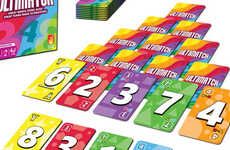
The Lucky Dogs Dice Game Encourages Players to Work Together
Katherine Pendrill — April 8, 2016 — Life-Stages
References: peaceablekingdom
The 'Lucky Dogs Dice Game' is a new product from Peaceable Kingdom that encourages children to work together to achieve a common goal. By promoting cooperation instead of competition, the game encourages friendly play.
The Lucky Dogs Dice Game is a strategy game that involves shared decision making. To play, children must strategize hoe to match the dice with the tiles that will spell out 'LUCKY DOGS.' While the game does require some critical thinking skills, it is still appropriate for children ages six and up. There is also no reading required, meaning children are encouraged to communicate with one another verbally to beat the game.
Designed for two to four players, the Lucky Dogs Dice Game gives children a fun way to learn about cooperation and team building as they work towards a common goal.
The Lucky Dogs Dice Game is a strategy game that involves shared decision making. To play, children must strategize hoe to match the dice with the tiles that will spell out 'LUCKY DOGS.' While the game does require some critical thinking skills, it is still appropriate for children ages six and up. There is also no reading required, meaning children are encouraged to communicate with one another verbally to beat the game.
Designed for two to four players, the Lucky Dogs Dice Game gives children a fun way to learn about cooperation and team building as they work towards a common goal.
Trend Themes
1. Cooperative Games - Games that promote cooperation over competition are becoming more popular.
2. Shared Decision Making - Games that involve shared decision making are seeing an increase in popularity, especially in the child education industry.
3. Non-competitive Games - Non-competitive games that promote friendly play and communication among children are gaining traction.
Industry Implications
1. Toy Industry - Toy companies can capitalize on the trend of cooperation-based games by creating more products that promote teamwork and shared decision making.
2. Education Industry - The education industry can benefit from the development of more non-competitive, interactive games that teach children social skills and teamwork.
3. Family Entertainment Industry - The family entertainment industry can benefit from creating more non-competitive games that encourage communication and cooperation within families.
2.1
Score
Popularity
Activity
Freshness























